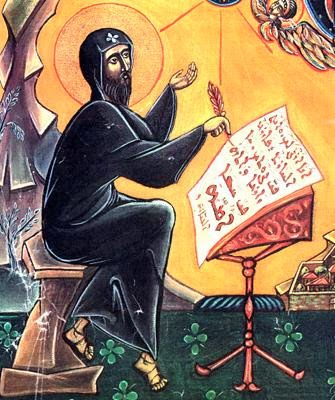We may be a little surprised to see how St. John the Baptist rails at the Pharisees and Sadducees who have come out to be baptized by him. He sounds almost disappointed that they have found out about him. How different this is from today when we beg people to come to Mass and are so excited to see someone who has long stayed away. The Pharisees and Sadducees would have needed endurance to stay through such an insult.
Sometimes the endurance required by God is of this kind. We try to approach him, but some human stands in the way. Whether they are a prophet sent by God to test our conversion by giving us some little resistance which we can only pass through with humble endurance or merely a jerk, does not matter. We can let God judge their actions on the day of judgement. We, however, must humbly endure, letting all pride die within us, and ask again for admittance.
We also will need a different kind of endurance. We want to approach God, but we are held back by our own desires. To follow God means to leave every sin behind, and many things also which are not sins must be forgotten. When we see the world around us enjoying its pleasures, we need endurance. This can easily be understood by anyone who has ever been on a diet while a friend is not. We do not even want to eat with them, lest we see a parade of what is forbidden to us. Some people misplace this frustration and expect that no one in the world should enjoy what they are unable to. What is needed is endurance.
Fortitude and temperance are the names of these kinds of endurance, and they are essential to the Christian life. Anyone who would be a saint (and what Christian does not want to be a saint) needs to master these two skills. Christian fortitude is humble because the battle is already won and we can only lose through pride. Christian temperance is humble because it does not whine like a little child abut how unfair it is that we cannot have something while someone else can.
But our God is not a God of endurance alone. Our religion is not simply a trial of endurance. They who endure to the end will be saved, but how could we possibly endure to the end! No, our God is a God of endurance and encouragement. Never do we encounter a new opportunity to humbly endure without also receiving great encouragement.
And what is the encouragement of God? It is unlike human encouragement. It is not simply a few words of well-wishing, spoken to break an uncomfortable silence. The encouragement of God is God himself. When we need encouraging, God comes to us.
God comes to us through the Holy Eucharist, where the Body, Blood, Soul, and Divinity of Jesus Christ dwells within us, and, because the Most Holy Trinity can never be separated, the Father and the Holy Spirit dwell with us also.
God come to us also through the Holy Spirit, in the other sacraments or even in a grace outside of the sacraments. Sometimes we become very aware of his presence through a feeling or a sudden memory of God's love for us. Sometimes we only know that we have been encouraged when we see afterward that we have endured the unendurable.
Truly this is what Advent is about, the encouragement of God. When the whole world seemed like it could not possibly endure anymore, God came to us, and what encouragement this was! When we see Mary and the little child, hope fills our heart. God so loved the world that he gave us his only begotten son. In that stable we have a mother who will care for us and a brother who is God himself. There will not come in our life anything to endure which God has not endured. There may be poverty; there may be pain; we might be unwelcome; we might be treated with disdain; we might be punished; we might be shamed, but we are not alone. God is with us.
